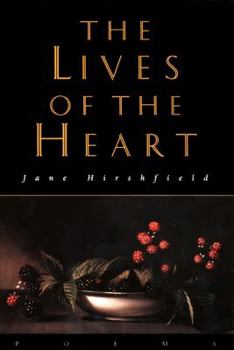The Lives of the Heart: Poems
Select Format
Select Condition 
Book Overview
A new volume of poems by the award-winning author of October Palace.
Format:Paperback
Language:English
ISBN:0060951699
ISBN13:9780060951696
Release Date:August 1997
Publisher:Harper Perennial
Length:128 Pages
Weight:0.38 lbs.
Dimensions:0.4" x 6.0" x 9.0"
Related Subjects
PoetryCustomer Reviews
2 ratings
A "Heart" of gold.
Published by Thriftbooks.com User , 23 years ago
"Take the used-up heart like a pebble/ and throw it far out," Jane Hirshfield writes in one of the eighty-two poems collected here. "You may do this, I tell you, it is permitted. Begin again the story of your life" ("Da Capa," p. 19). I arrived at this 1997 book of poetry after reading Hirshfield's equally stunning collection, GIVEN SUGAR, GIVEN SALT, earlier this year. These poems are meditations upon the heart, shaped from its interior mysteries. These poems speak to those readers who have also experienced those mysteries.In a recent interview, Hirshfield said that "the dharma of life" teaches us to notice "our day-to-day interdependence with other people, animals, plants, objects. The experience of interconnection is rubbed into us, hour by hour, until we carry its evidence within us as a kind of patina. Love, loss, desire, hunger, fatigue, grief wear us down into the acknowledgement of our true nature--which is, paradoxically, that we have no true nature separate from everything else. Not one corner of this world is unconnected to all the rest" ("The Bloomsbury Review," July/August 2001). That dharma is evident in these poems.Many of Hirshfield's poems are drawn from her observations of the natural world. "The rains come," she writes in "The Roses of Nag Hammadi Library," "the deer slip back into the mountains/ like hungry, rose-colored smoke./ They move mouthful by mouthful; pensive,/ they slowly rise" (p. 36). In "Respite," she writes, "Passing the fig tree/ I see it is/ suddenly huge with green fruit,/ which may ripen or not." And "Near the gate," she writes in the same poem, "I stop to watch/ the sugar ants climb the top bar/ and cross at the latch,/ as they have now in summer for years./ In this way I study my life" (p. 49)."Poetry's work is the magnification and clarification of being," Hirshfield wrote in the Preface to her book, NINE GATES. "Through poetry," she said in the previously-mentioned interview, "we can know our individual lives and all of life more fully, more richly--we're given a broader existence." From the "fragrant carpets of alpine flowers" (p. 3) to salty heartache, Hirshfield wanders the landscape of the human heartland in this truly passionate collection of poetry, showing us how to live life deeply along the way.G. Merritt
Moving toward the heart
Published by Thriftbooks.com User , 23 years ago
I admire and enjoy Jane Hirshfield's work, and, as always, appreciate her audacity in using the word 'heart' (a poetry workshop reject) as the core of her book. On a metaphysical level, heart is all there is, because heart is the essence of a thing. Jane expounds on this assumption by evocatively portraying aspects of the heart to her readers. I highly recommend this book and have turned to it often as inspiration for my own writing; Jane asks not only how, and what, but also why, pointing to the open-ended space at the end of words. Buy the book. (P.S. This review was not an exercise in brevity.)





